Bangladesh - Memories of Dhaka, by Simon Watts (1981-1985)

PICTURE - MY 'RAMP CAR GUARD' AND HER SMALL BROTHER
In the eighties, Dhaka (Dacca) was considered one of the toughest postings with British Airways and prior to my arrival most Station Officers had a short term 'development' posting there, the logic being that if you survived Dhaka you could survive anywhere.....
Tejgaon airport in the city was initially served by VC10 aircraft and was an antiquated facility, with a very uneven runway due to bomb damage sustained during the war of 1972.
My arrival in 1981 was soon after Zia International Airport opened and VC10s were replaced by Tri-star L1011 aircraft. BA decided that a more permanent airport presence was required, so my 6 month temporary posting became a 4 year contract. I was delighted. Bangladesh is a fascinating country and I am privileged to have lived there. I learned a lot and will never forget the experience.
Bangladesh, previously East Bengal in British India and then East Pakistan after partition, with a small provincial capital, Dacca, had no infrastructure nor exports, apart from jute, to sustain an independent economy when it gained independence in 1972. As a result, in the eighties the country survived on foreign aid with large numbers of expatriate 'experts' assisting in developing the economy. A notable example was a team from Lancashire setting up a garment industry, which is now a huge export business and (controversial) employer. There was also a very large British High Commission overseas aid section and immigration section, staffed by expatriates, due to the large numbers of potential Bangladeshi migrants to the UK. Various UN agencies were also represented. BA was therefore very busy servicing the UK and European expatriate community, the migrants and VFR (visiting friends and relatives) traffic to the UK, mainly from Sylhet district as well as Bangladeshi expatriate workers to and from the Persian Gulf via Doha in Qatar.
There were no tourists, apart from the odd lost backpacker. A wonderfully misspelt tourist poster said it all: 'Visit Bangladesh before the tourist comes', note 'tourist' in the singular. Foreigners were a novelty and attracted large crowds - I remember getting a flat tyre on the way to work and a kindly passer-by offered to change my wheel (I was after all wearing my smart and clean BA uniform). A crowd quickly gathered watching me, but I then noticed a man in the crowd with a deformed hand, his index finger at least two feet long... And they kept staring at me! Heartbreaking sights every day with abject poverty and beggars at every turn.
There were two Tri-star turnaround services per week via Doha and Calcutta to London. There was no catering or water uplift in Dhaka and engineering was provided from Calcutta. No airport computer systems, no international telephones and no CNN, so you were very much on your own. I remember following the Falklands war over the BBC World Service on my SSB radio.
The BA crew stayed in Dhaka between flights and rarely left the hotel. There was one notable exception: stewardess Pat Kerr, OBE, became famous for setting up Sreepur village for orphans (she is still there).
Dhaka then had a population of less than 3 million (today 12 million and counting) mostly concentrated in Old Dhaka on the banks of a Meghna river tributary, a truly medieval place, I remember the Armenian church amongst it all. The new airport was surrounded by farmland and rice paddies, with suburbs slowly growing outwards from the city. Most expatriates lived in Gulshan or Banani near to the airport, where all the embassies were. There were a lot of lakes and paddy fields.
The weather was extreme, with a very intense monsoon season when half the country floods and devastating cyclones occur. The airport was regularly flooded, causing reduced runway length availability. For a few months over winter, the climate was dry and cool but the humidity in the summer was intense.
Expatriate life revolved around the various diplomatic clubs; the Brits, as only the Brits would, had two - The BHC club and the British Aid Guest House Association or BAGHA club, the more 'earthy' of the two. BA expat staff, the country manager and I were honorary members of both and I served as the 'bar' member at the BAGHA for a time. My main role was the acquisition of alcohol from the various members’ duty free allowances! Life was very much work, sleep and club (drinking and/or sport) with a very active Hash House Harriers. During the curfew that followed the coup in 1982, those in the BAGHA club remained for three days and emptied the bar..
Also popular were the U.S. Marine house on Fridays and the Australian High Commission club for barbecues. There were only two international standard hotels and very few restaurants. Very little crime against foreigners so no safety concerns, apart from health and accidents on the roads, which were very common (killer buses the press called them - imported chassis with locally made timber bodies). If you got sick you left, normally on Thai International to Bangkok. Too many stories of ants in intravenous drips in Dhaka hospitals and demands for prepayment before any treatment. Some practising doctors displayed brass plaques stating that they had studied medicine abroad but failed (better than nothing so OK to practise!)
During HM the Queen’s visit in 1983 a garden party was held at the High Commissioner’s residence and all British nationals were invited and asked to wear formal attire or national dress. Some of the VSOs (volunteers) had suits made by local tailors and I remember one, bright pillar box red with a huge bright green kipper tie. All the High Commission staff were trying to shield the Queen from him!
Social life could be interesting; I once imported a 44 pint keg of real ale as baggage after a trip to the UK and convinced customs in Dhaka that it was a special type of engine oil, thoroughly enjoyed at the BAGHA club that evening!
Cycle rickshaws were the mode of transport for the masses and a group was always on hand outside the clubs to take people home; often the rickshaw wallah would end up on the seat with the drunken expats holding impromptu cycle races through the streets at dead of night. My farewell gift from BA was a tapestry of a rickshaw with a sari clad lady as passenger, as a reminder of the number I had gently knocked over during my mad drives through the centre of Dhaka. A BA Captain purchased a rickshaw and rode it on to the tarmac in full uniform at the airport to be loaded on to the aircraft; it's now somewhere in Berkshire!
Travel within the country was often interesting; I was on the night mail to Sylhet when a band of 'dacoits' took over the train and rode all the way on the roof. I also visited a friend who worked on an ODA fisheries project in the west of the country and a ferry ride across the Padma River was required, as wide as an inland sea. The ferry started to list half way across so two fully loaded trucks were pushed overboard!
The BA City office was in Motijheel commercial area in Dhaka and we regularly got calls from the public asking when the Saatchi and Saatchi Manhattan TV advertisement was on, as it was the best thing on Bangladesh TV. There was a wonderful headline in the local paper 'Biman crashes again' referring to the local airline’s soccer team, not the airline itself.
Once when I was acting country manager I was approached by a recruiter from one of the Gulf States enquiring about airfares for workers. When I gave him the price he asked how many could be accommodated in a cargo container. He was not joking.
Zia international Airport was new but rundown, prone to flooding and with regular power cuts. No aero bridges, so passengers walked to the aircraft or took very ancient buses in bad weather. Terrible toilets, I never used one in over four years, preferring the quick drive home, or using the aircraft facilities in emergencies, sometimes to the surprise of arriving passengers.
The UN provided two brand new airport fire fighting vehicles, one of which was written off within a week when it rolled, cornering too fast on the taxiway.
The airport was closed without notice whenever a VIP travelled and once a dais was constructed on the tarmac to welcome the president home from an overseas visit only to be blown away by an overzealous BA Tri-star Captain during taxying. Meanwhile an engineer and I were both marshalling the BA aircraft to two different stands, wondering why the aircraft was parked at the entrance to the ramp flashing its landing lights.
One Christmas, the Tri-star Captain operated the last sector Calcutta to Dhaka dressed as Santa Claus and arrived in the terminal via a baggage cart and baggage carousel, wondering why no one understood, Bangladesh being a predominantly Muslim country that doesn't celebrate Christmas. A coffin was delivered on the baggage carousel on the same flight, much to the horror of passengers.
A swarm of bees once carpeted the passenger steps just as it was about to be positioned onto the arrival aircraft, delaying the passengers. The steps driver fearlessly positioned the steps anyway.
A number of cargo containers went missing and later turned up at a local village as houses; pre arrival checks included ensuring that no villagers were crossing the runway as a short cut home, often on bicycles. The runway bisected a historic access road which they tried to continue using after the airport was built.
One of my fondest memories was a young girl with her baby brother permanently on her hip who guarded my ramp car religiously for over four years when parked at the airport. I paid for her education, provided stationery and clothes for her family and we became great friends. She turned up in her best sari with her whole village to see me off when I left the country at the end of my posting; a very emotional day indeed.
Some wonderful moments at the airport included a well-known British politician panicking in the lounge and breaking the door down thinking he had been forgotten and was going to miss his flight. During Hajj there was a 'lathi' charge by police in the terminal to control check-in queues catching charters to Jeddah. One Hajj passenger boarded a parked Bangladesh Biman B707 in error and spent the night asleep in the cockpit.
On one occasion an English girl who married a Bangladeshi was abandoned in his home village and after being rescued by the High Commission was flown back to the UK weighing less than 100lbs. I remember her being carried like a baby by a porter. An arriving passenger from the UK with 'newsagent' as occupation in his passport was denied entry to Bangladesh as a journalist. Some passengers had never seen a western toilet and needed training before boarding aircraft. We even produced leaflets and an inflight instructional video! Babies were sometimes held over the aircraft aisle to pee - as was the norm on local buses.
Technical delays were thankfully rare but on one occasion during an extended delay, passengers who had never been to a big city spent the whole night in the western style Sonargaon hotel travelling up and down in the hotel elevator, as they had never seen one before. They preferred to camp out in the lobby.
The local staff were amazing, Zakiullah, whose sole job was to load crew bags and beat off the crowds that would surround the crew bus, was so loyal that he came to work the day his child had died and never told anyone until the flight departed. Broke my heart.
I used to go to Calcutta for the weekend for some R+R which says it all really!
Dhaka was the most extraordinary four years of my life, I later was posted to Africa which had different challenges but nothing quite like Bangladesh!
UPPER PICTURES -
BA ADVERTISING ON BACK OF MOTOR RICKSHAW IN FULL VIEW OF VEHICLE AND AS ENLARGED ADVERT
RICKSHAW DHAKA, 1983
LOWER PICTURES - FERRIES AND RIVER TAXI ON THE PADMA RIVER
THE PEOPLE OF BANGLADESH
HRH PRINCESS ANNE IN DHAKA
MY BANGLADESH FAREWELL


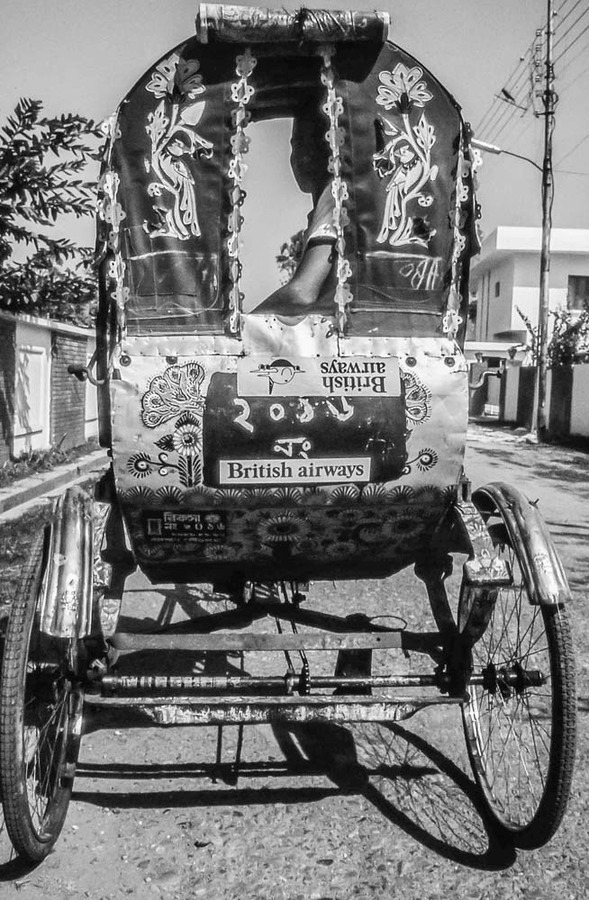
WATER EVERYWHERE...Crossing the Padma
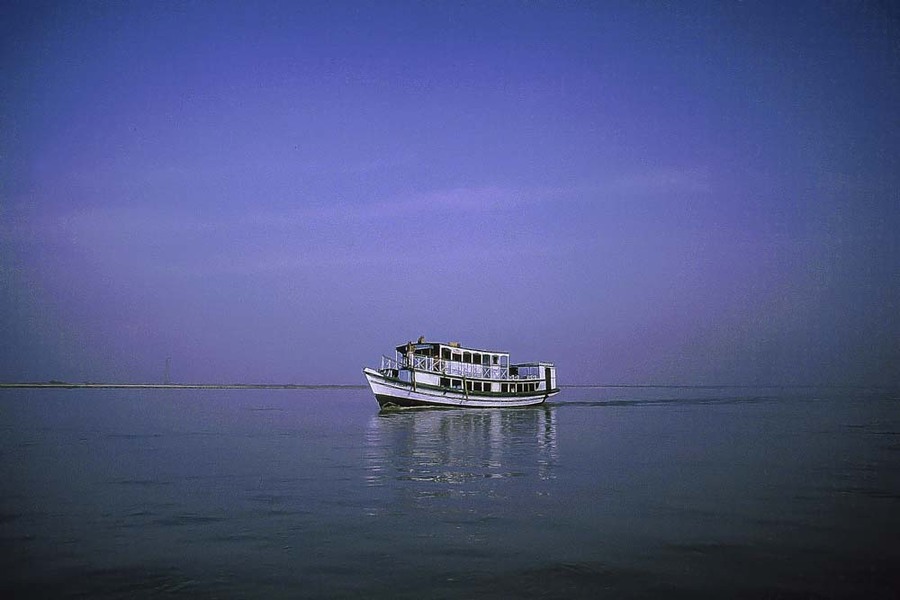
....and Ferry on the Padma
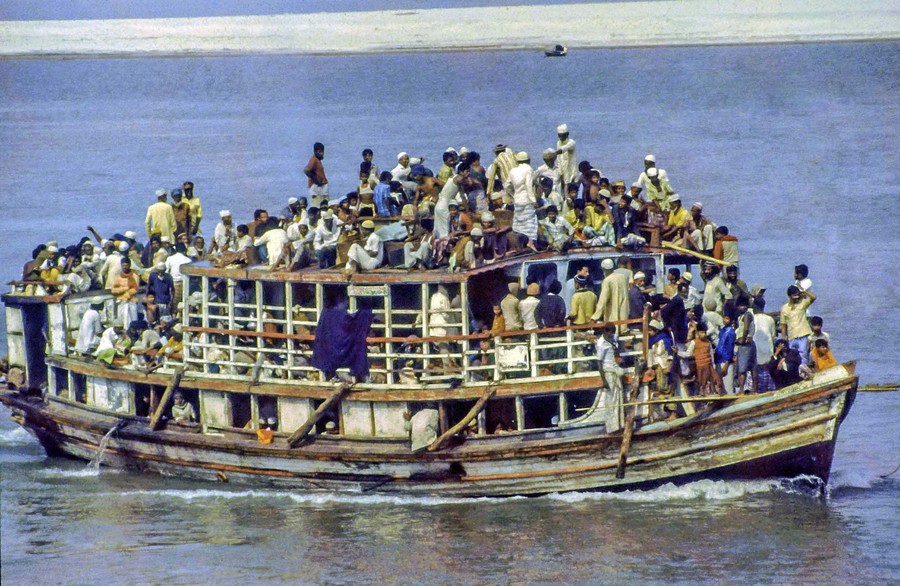
Ferry to Comilla
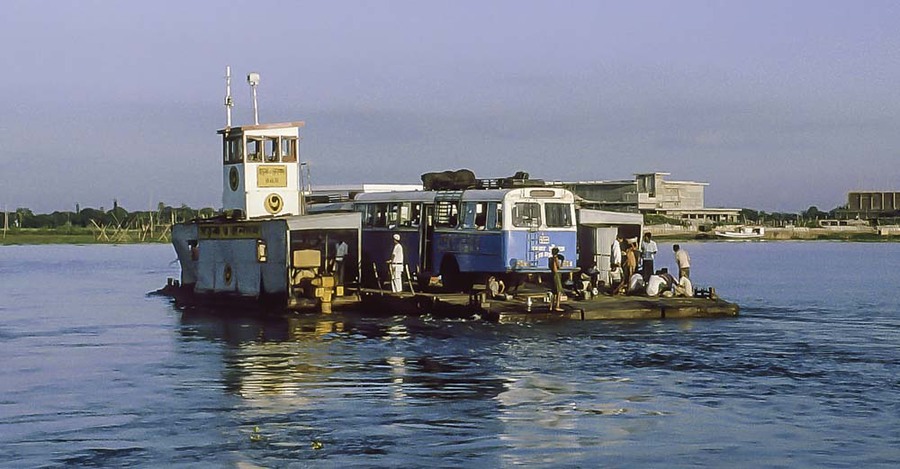
River taxi, Old Dhaka
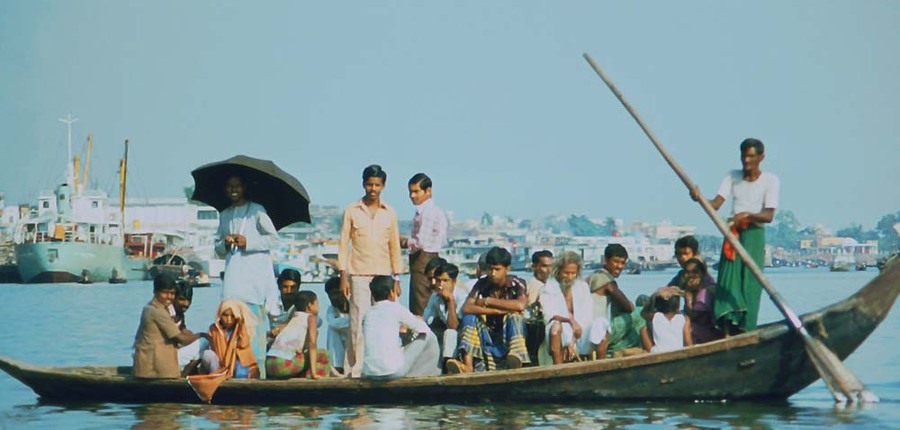
River Commerce...
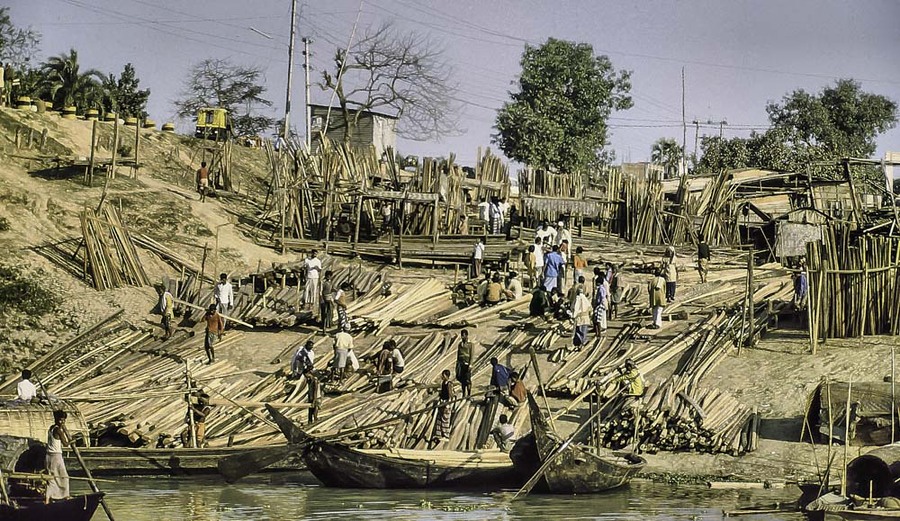
Young Boy on the River, Gulshan

Paddy Fields
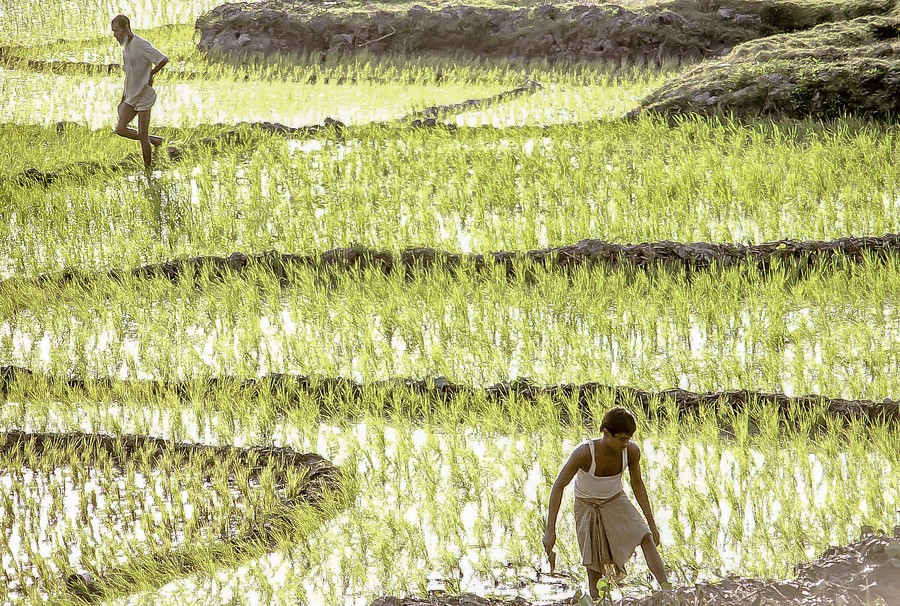
The people of Bangladesh were willing and photogenic subjects.. this is a selection of my favourite shots...
...Boy on the Ferry to Chittagong
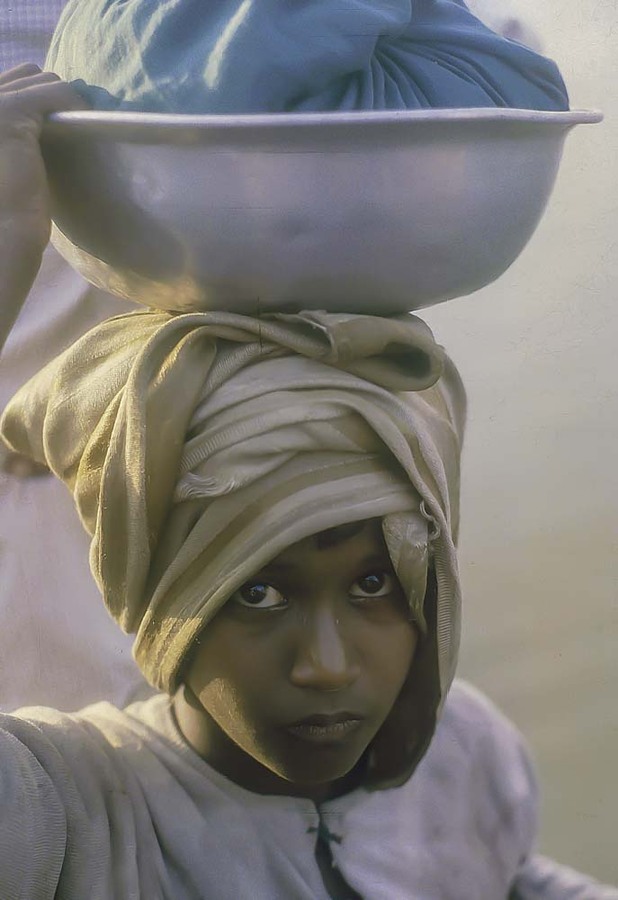
Children in Bangladesh
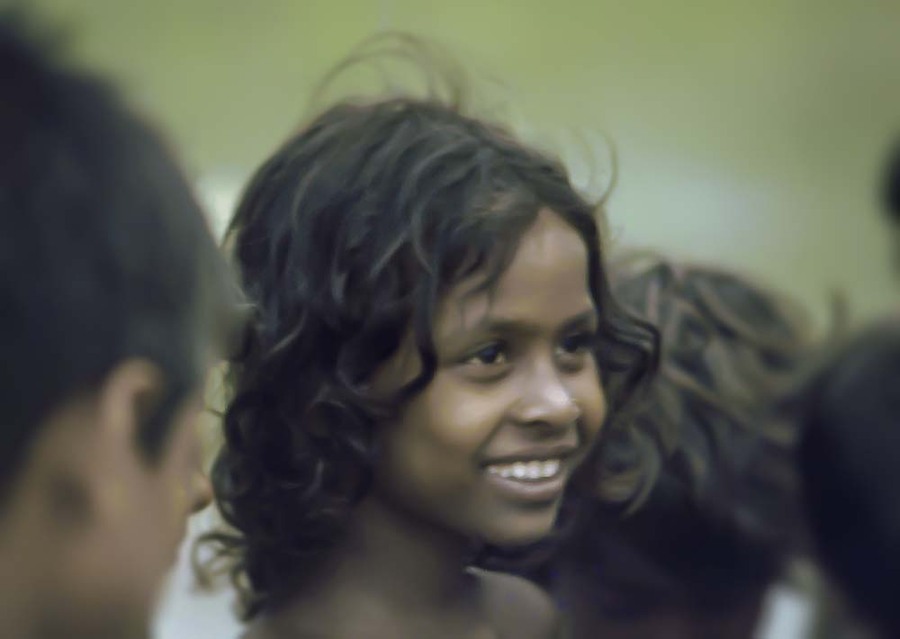
Bazaar in Dhaka

Bangladesh Family
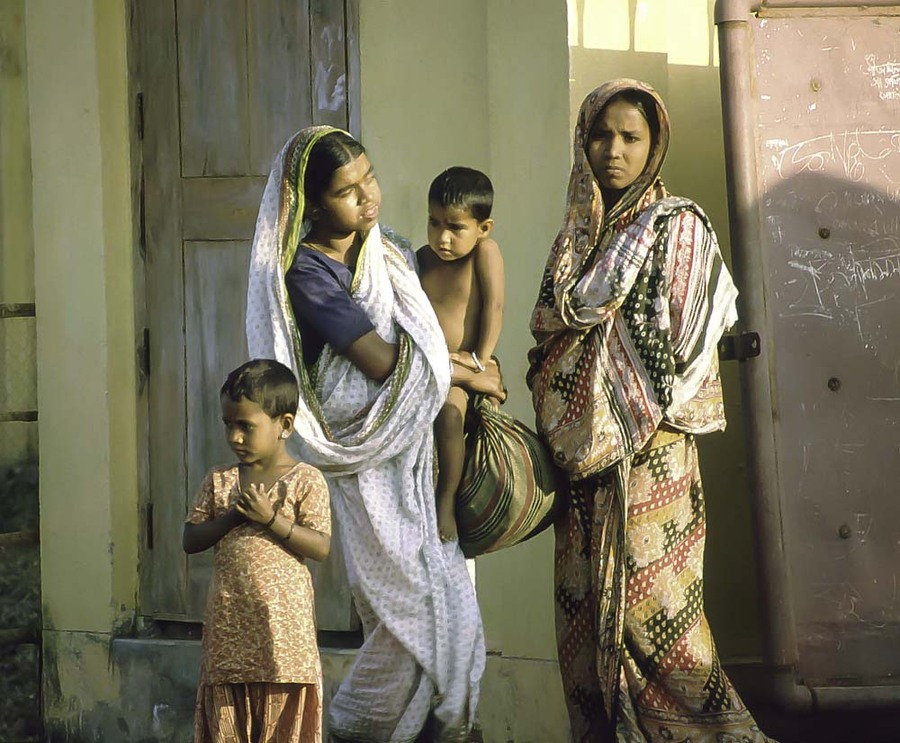
Girl in Tongi

Heavy Load on the Ferry to Comilla
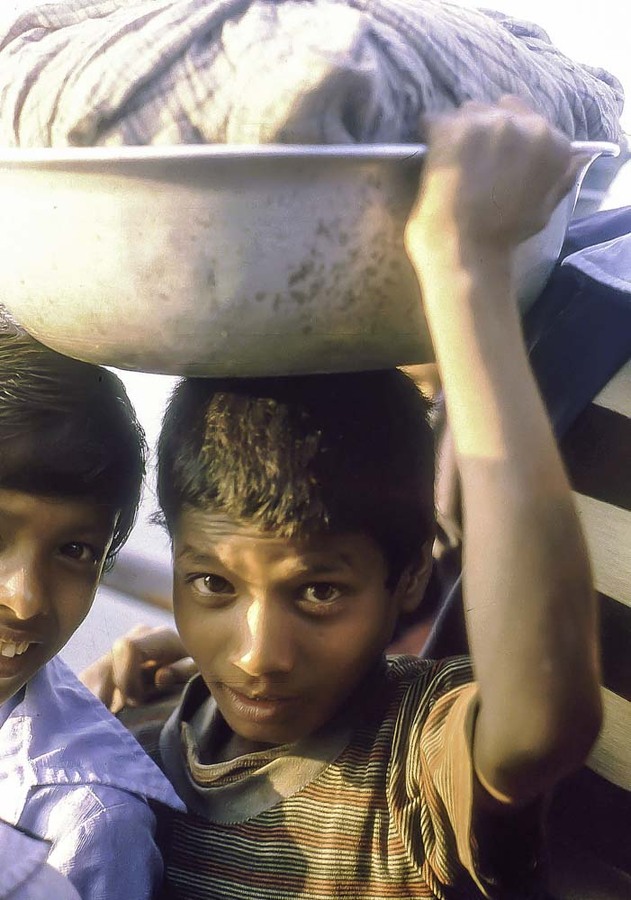
Old Man in Damrai

Dhaka Family
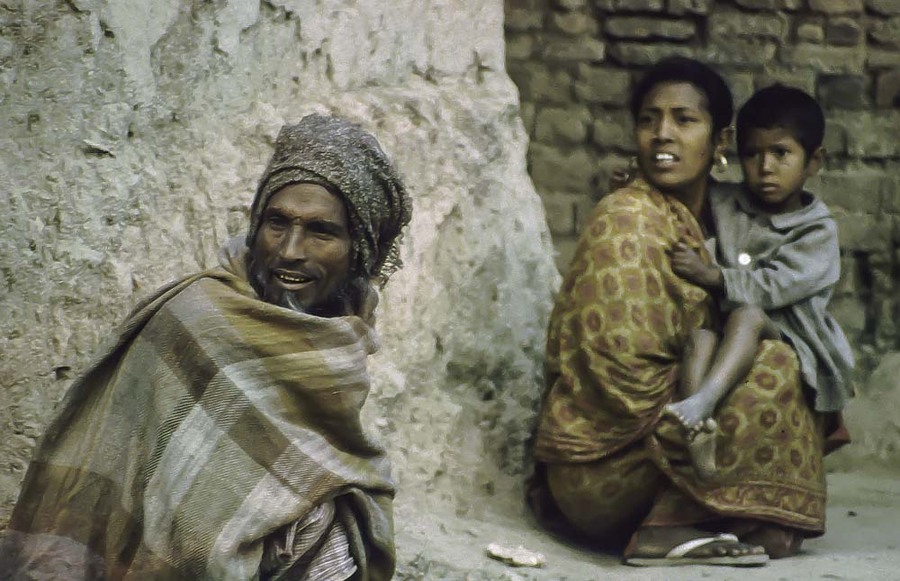
Night Mail Train to Sylhet

Visit of HRH Princess Anne to Dhaka
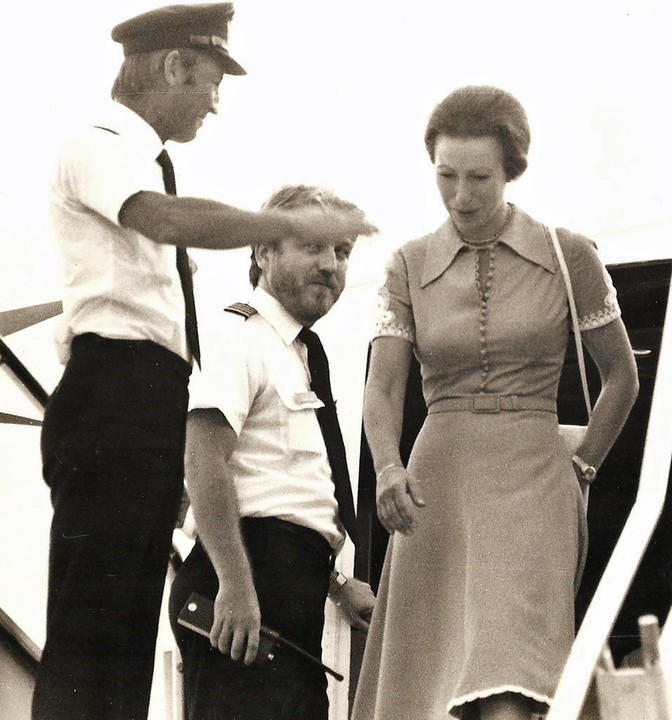
My Fond Bangladesh Farewell

|